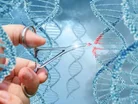CRISPR is now used to edit mutations which cause heart failure

The use of gene editing tools are now being utilised by scientists in order to eradicate potential, hereditary diseases. Mutations within human embryos are being ‘cut’ out through the use of the CRISPR tool, and in this case, has been able to eradicate heart condition hypertrophic cardiomyopathy in 42 embryos.
The Centers for Disease Control and Prevention have stated that hypertrophic cardiomyopathy is one of the most common inherited heart diseases, which can result in sudden cardiac fatalities for patients with the unknowing hereditary trait.
Although enabling an embryo with ‘edited’ human DNA to become a full-term baby has been outlawed globally, it is a huge breakthrough for scientists who wish to eradicate potential hereditary diseases which can impact a patient’s quality of life. There is now increased hope to source and eradicate diseases such as cystic fibrosis.
“They’ve got remarkably good results, it’s a big advance.” said Richard Hynes, a geneticist at MIT. “This brings it closer to clinic, but there’s still a lot of work to do.”
With clinical research will have to abide by strict regulatory hurdles, especially within the US and the UK. Embryos used in the study were terminated at five days.
Related stories
- The European Medicines Agency (EMA) has released its Brexit plan
- Scientists in the US have edited the DNA of human embryos for the first time
- Comment: Internet of Things will revolutionise how healthcare is delivered
George Annas, Director of the Center for Health Law, Ethics & Human Rights at Boston University’s School of Public Health has condemned the move. “This is unethical human experimentation on the resulting child, and because this change is in the child’s germline, the experiment will continue for generations—including at least the resulting child’s children, grandchildren, and great-grandchildren. Neither the child nor any of his or her own children can, of course, consent to be part of this risky experiment,” he says.
“If we want to avoid turning babies into manufactured products, changing the nature of what it means to be human, and perhaps developing a superior race that could see us as subhuman, we need to outlaw the use of genetic editing technology on human embryos.
The agenda to control human evolution and the genetics of our children cannot be left to a subgroup of scientists who cannot control themselves.”
With this in mind, Dr Shoukhrat Mitalipov, a researcher at Oregon Health & Science University has stated that he is aware of the ongoing ethical debates of gene editing and where it will lead, stating that regulations will need to be made clearer, otherwise “this technology will be shifted to unregulated areas, which shouldn't be happening.”
Tags
research- Research Breakthrough Promises New Lupus TreatmentsMedical Devices & Pharma
- More bill reminders don't lead to more payment, study claimsTechnology & AI
- Biosample Hub: tackling the crisis in biotech researchMedical Devices & Pharma
- H1 launches online platform for healthcare professionalsDigital Healthcare



